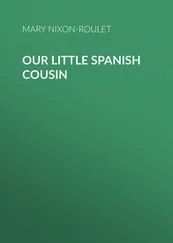Mary Wade - Alila, Our Little Philippine Cousin
Здесь есть возможность читать онлайн «Mary Wade - Alila, Our Little Philippine Cousin» — ознакомительный отрывок электронной книги совершенно бесплатно, а после прочтения отрывка купить полную версию. В некоторых случаях можно слушать аудио, скачать через торрент в формате fb2 и присутствует краткое содержание. Жанр: foreign_prose, foreign_language, на английском языке. Описание произведения, (предисловие) а так же отзывы посетителей доступны на портале библиотеки ЛибКат.
- Название:Alila, Our Little Philippine Cousin
- Автор:
- Жанр:
- Год:неизвестен
- ISBN:нет данных
- Рейтинг книги:5 / 5. Голосов: 1
-
Избранное:Добавить в избранное
- Отзывы:
-
Ваша оценка:
- 100
- 1
- 2
- 3
- 4
- 5
Alila, Our Little Philippine Cousin: краткое содержание, описание и аннотация
Предлагаем к чтению аннотацию, описание, краткое содержание или предисловие (зависит от того, что написал сам автор книги «Alila, Our Little Philippine Cousin»). Если вы не нашли необходимую информацию о книге — напишите в комментариях, мы постараемся отыскать её.
Alila, Our Little Philippine Cousin — читать онлайн ознакомительный отрывок
Ниже представлен текст книги, разбитый по страницам. Система сохранения места последней прочитанной страницы, позволяет с удобством читать онлайн бесплатно книгу «Alila, Our Little Philippine Cousin», без необходимости каждый раз заново искать на чём Вы остановились. Поставьте закладку, и сможете в любой момент перейти на страницу, на которой закончили чтение.
Интервал:
Закладка:
Mary Hazelton Wade
Alila, Our Little Philippine Cousin
On the farther side of the great Pacific Ocean are the Philippine Islands. These form one of the many island groups that hang like a fringe or festoon on the skirt of the continent of Asia. Like most of the islands in the Pacific, the Philippines are inhabited by people belonging to the brown race, one of the great divisions of the family of mankind.
The Philippines are shared by many tribes, all belonging to the same brown race. People of one tribe may be found on one of these islands; those of a different tribe are living on another; or one tribe may live in a valley and its neighbour in the hills; and so on to the number of eighty tribes. Each tribe has its own customs and ways. And yet we shall call these various peoples of the brown race our cousins; for not only are they our kindred by the ties which unite all the races of men in this world; they have been adopted into the family of our own nation, the United States of America.
The people of these islands are many of them wild and distrustful children. They have no faith in us; they do not wish to obey our laws. If we are in earnest in our wish to do them good, and not harm, we must learn to know them better, so that we may understand their needs. That is one reason why we are going to learn about our little Philippine cousin, Alila of Luzon.
CHAPTER I.
THE NEW BABY
Alila is such a strong, active boy now, it is hard to imagine him in his babyhood, – he was such a tiny brown tot!
His nose was so flat one would hardly have noticed there was a nose at all, except for the wideness of the nostrils. His big black eyes seemed to be moving around all the time, as much as to say:
"I must find out everything I can, and just as fast as I can, about this queer place in which I find myself."
His hair was straight and coarse and black, even on the day he was born. It was quite warm (in fact, almost all the days are warm in the Philippines), yet the doorway was carefully covered and the windows closed tightly.
Now, why do you suppose Alila found himself shut up in a close room like that when he first entered this big round world of ours, while there was such a soft gentle breeze outside as scarcely to move the tops of the cacao-trees in the garden?
The fact is, Alila's father, who is not afraid of the wild buffalo nor the boa-constrictor, nor even the huge cayman, is constantly dreading the evil that bad spirits may bring to him. And now he had a darling boy of his very own! According to the beliefs of his people, no evil spirit must be allowed to enter a home when a child is born, or the little one might be troubled by the spirit for the rest of his life.
So the loving parent walked back and forth over the roof waving a bolo in his hand, as much as to say:
"Look out, spirits, or you may get your throats cut. Keep away from here. Do not try to get inside to trouble my little one."
He did this very earnestly in the first hour of Alila's life, although he was shown the foolishness of such ideas by the priests the Spaniards sent among his people.
He is a small man, this father of Alila. He has high cheek-bones like the Chinese and Japanese, and no beard upon his face.
When he felt that everything was really safe, he climbed down from the thatched roof, and, opening the door as little as possible, went softly up to the mat where the baby lay and kissed him.
But, dear me! not all persons kiss the way we do, and this father of the Malay race seemed rather to smell the baby than anything else we can think of. He placed his own nose and lips on the baby's cheek and drew a long breath. It was done to show his love, and that is what any kiss is given for, is it not?
This baby's bed would not, perhaps, suit all the other babies in the world. Some of those babies we know are cared for on cushions of down and wrapped in soft flannels and delicate muslins. But what did black-eyed Alila care for that? To be sure, he lay on a mat of woven palm leaves, but it was sweet and fresh.
And although the floor his eyes sometimes rested on was not covered with a rich velvet carpet, it was smooth and clean, for it was made of split bamboos flattened and fitted close together. And oh, that floor was beautifully polished by Mother Nature herself, for the bamboos as they grow are covered on the outside with a coating of the finest and hardest varnish.
If Alila could have thought about it at all, he would have considered himself more fortunate than most babies, – for did not his own dear mother, who lay at his side, make every bit of the spread which covered his tiny body? She had taken the fibres of pineapple leaves and hemp and woven them together.
But that alone would not make the spread beautiful enough for her dear one. It must be given a bright colour, so she searched through the woods till she found a sapan-wood tree; then, breaking off some branches and opening them, she took a substance from the heart of each and made a crimson dye.
So you can see that the cover was done entirely by Alila's mother; and you can ask yourself if that wasn't a hundred times better than buying cloth out of a store. That would not have the touch of love in its making.
There was something else in Alila's home one does not see in other lands. Whenever the baby's eyes turned toward the light, they found it very soft and restful, for it came through a window in which were fitted the inner shells of a certain kind of oyster.
It was so pretty! The colours of the rainbow shone there in pale tints, and the flaring sunshine could not enter. The room was kept in a sort of twilight all day long, and made it pleasant for the new-born baby and his mamma to doze and dream.
CHAPTER II.
HIS FIRST PARTY
Alila was not two hours old before friends began to arrive to see him. But they did not enter suddenly! That would have been the height of rudeness. As they reached the doorway, each in turn stood for a long time on the outside, making many complimentary remarks to Alila's family. That was their way of showing themselves well-mannered and polite.
The Tagals, for that is the name of this tribe of people, never do anything suddenly. They do not appear to believe in surprise parties.
When all the fine speeches which seemed proper had been made, they entered the little house and came to the side of the new baby. They made the young mother very proud by the praise they gave her tiny son.
But she and her husband were not the only ones pleased. There was Alila's grandmother, who was always the most honoured one in the household; there was also an aunt who made her home here as she was too poor to have one of her own; and beside these, there was a lame old man, a friend of the family, who had come to them for shelter. The Tagals are so hospitable they will never turn any one from their homes.
As one visitor after another arrived, the little house became crowded. If it had not been for the high, dome-shaped roof, the air would have grown heavy and impure. As it was, Alila and his mother soon grew very tired and closed their eyes in sleep.
"That is good," said the grandmother, "we must let her rest. We will go out under the cacao-trees and talk, and I will bring some cocoa wine and betel to you there."
This old woman was certainly not pretty, although good and thoughtful. As she stood talking to the visitors in low tones, one could see how short she was. Her coarse, black hair grew down upon her forehead almost to her eyebrows; her wrinkled skin was dark brown; her eyes were large and round and, like her baby grandchild's, ever turning in a new direction.
She was dressed in a short skirt much like those of the other women of the party; it was of three colours, – green, white, and bright red. Over this she wore a large piece of blue cotton cloth, cut in the shape of an oblong, tucked in at the waist and hanging over her skirt almost down to her knees. No shoes or stockings covered the bare legs or feet, but she did not seem to miss them.
Читать дальшеИнтервал:
Закладка:
Похожие книги на «Alila, Our Little Philippine Cousin»
Представляем Вашему вниманию похожие книги на «Alila, Our Little Philippine Cousin» списком для выбора. Мы отобрали схожую по названию и смыслу литературу в надежде предоставить читателям больше вариантов отыскать новые, интересные, ещё непрочитанные произведения.
Обсуждение, отзывы о книге «Alila, Our Little Philippine Cousin» и просто собственные мнения читателей. Оставьте ваши комментарии, напишите, что Вы думаете о произведении, его смысле или главных героях. Укажите что конкретно понравилось, а что нет, и почему Вы так считаете.












